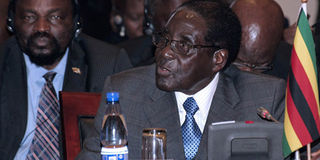Over two million Zimbabweans face food shortage

President Robert Mugabe of Zimbabwe. His country faces food shortage with a study showing that at least 2.2 million Zimbabweans will need food aid between January and March 2014. President Mugabe’s Zanu PF party denies accusations that the land reform programme meant to give land back to landless blacks destroyed agriculture. PHOTO|FILE.
What you need to know:
- Four provinces – Matabeleland South, Masvingo, Midlands and Manicaland – face dire food shortages.
- Zimbabwe, once regarded the bread basket of Africa, started experiencing serious food deficits over a decade ago after President Robert Mugabe’s government embarked on a violent land reform programme.
HARARE, Wednesday
At least 2.2 million Zimbabweans will need food aid between January and March next year, the latest study by the government and donors has revealed.
According to the Zimbabwe Vulnerability Assessment Committee (ZIMVAC), the study conducted in May and June showed that 1, 5 million people were food insecure.
Four provinces – Matabeleland South, Masvingo, Midlands and Manicaland – face dire food shortages.
Agriculture minister Joseph Made today said the country was importing maize from Zambia to alleviate the food shortages.
“We have since written to the Finance ministry for more funds to enable the movement of grain from Zambia,” Mr Made told state media.
Zimbabwe, once regarded the bread basket of Africa, started experiencing serious food deficits over a decade ago after President Robert Mugabe’s government embarked on a violent land reform programme.
Some of the displaced 4,000 white commercial farmers were given land in neighbouring Zambia where they have no boosted the country’s maize production significantly.
The ZIMVAC report says the number of rural households that are insecure this year has gone up by six per cent from 2012.
Food insecure households need at least 177,000 tonnes of maize, the report says.
Besides poor preparations ahead of last year’s cropping season, the affected provinces were hit by a severe drought that resulted in massive crop failure.
President Mugabe’s Zanu PF party denies accusations that the land reform programme meant to give land back to landless blacks destroyed agriculture, blames the poor harvests on former Finance minister Tendai Biti.
Mr Biti, a senior official in former Prime Minister Morgan Tsvangirai’s Movement for Democratic Change (MDC) party was accused of starving farmers of funding.
Last week, a $100 million facility secured by a private bank from the African Export and Import Bank was unveiled to support agriculture and related infrastructure projects during the 2013/14 farming season.
However, critics say Zimbabwe’s new farmers lack the necessary skills and equipment to help turn the country’s agriculture industry around.
Meanwhile, Zimbabwe said it had summoned the US ambassador in Harare over the frisking of its foreign minister on a recent trip to the United States.
Foreign Minister Simbarashe Mumbengegwi was asked to go through security checks at New York’s JFK airport, in an apparent denial of diplomatic privilege.
Permanent secretary Joey Bimha said ministry officials had on Monday met the US ambassador Bruce Wharton following the airport incident.
“I confirm we met the ambassador yesterday,” Mr Bimha told AFP. “He has since apologised and said he is going to find out what happened.”
Mr Mumbengegwi was returning home after attending the UN General Assembly as part of the entourage accompanying President Mugabe.
Zimbabwe’s relations with the United States strained after Washington imposed targeted sanctions on Zimbabwe following elections in 2002, which western observers said were rigged to hand Mugabe victory.
The sanctions include travel restrictions on Mugabe and members of his inner circle and a freeze of assets belonging to Mugabe’s allies or entities with links to him and his ruling ZANU-PF party.
In 2005, Zimbabwe threatened to expel the then ambassador Christopher Dell for allegedly interfering in its political affairs.
Dell was also reprimanded for entering a restricted area of the national botanical gardens in Harare.
The US rejected the results of the last July elections which extended Mugabe’s 33-year rule on grounds that the polls were not credible.
The results were also disputed by Mugabe’s main rival Morgan Tsvangirai as “a massive fraud.”




